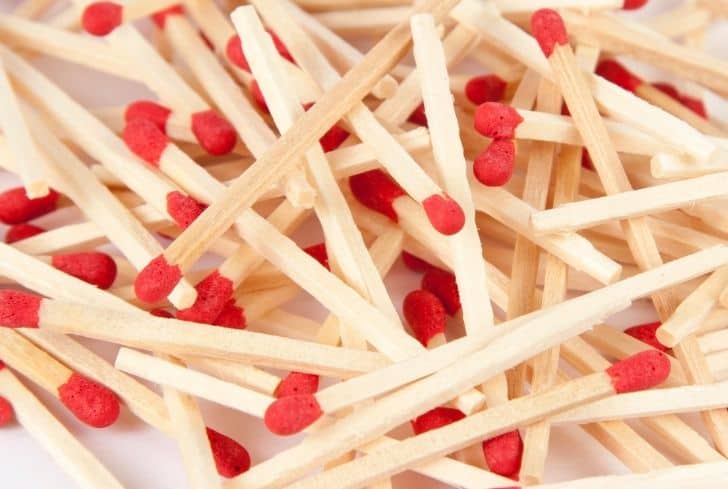If you’re a bit of a green thumb, you’ll likely be interested in turning all your biodegradable waste into compost materials for your plants. That’s an excellent idea, as it helps you cut back on costs that would otherwise have gone into purchasing fertilizer for your plants.
Creating your own fertilizer for your plants is better not just for cutting costs but also to ensure genuineness. After all, you never can tell what’s been infused into store-bought fertilizers!
Since matches are household items we use pretty frequently, wouldn’t it be awesome if we could just dispose of them in our compost piles? Well, that’s only possible if matches are compostable. In this blog post, we’ll answer your questions on whether or not matches can be composted, recycled, and how they’re properly disposed of. So please, dive right in.
Can You Compost Matches?
We understand that you may be new to gardening and not fully understand what composting is or the suitable materials for a compost pile. As such, we’ll delve briefly into what composting is, and if matches qualify as a suitable compost material.
Typically, composting entails gathering waste products from your home and dumping them in a hole in the ground. Some of these products include food waste and biodegradable waste such as paper, tea and coffee filter bags, and just about any material that microorganisms can break down quickly.
While you can compost almost any biodegradable material, there are some waste products that you shouldn’t put in your personal compost pile or your community’s. For one, you should never put leftover meat, fish, milk products or even baked goods in the compost pile. It’ll attract pests, and we’ll explain further in subsequent sections.
The materials in your compost pile get broken down within four weeks to twelve months. However, since you place different materials there, you can expect each one to take varying periods to decompose.
Now, can you include matches in this compost pile? Well, the short answer is yes. Matches are made from wood and have components of potassium chlorate, phosphorus sulfide, binders, fillers, and a bunch of other ingredients that don’t really concern us.
However, since you’ll be composting only used match sticks, they can go in your compost pile. If the match sticks are unused, on the other hand, they can be dangerous to the soil, your other compost materials, and, most importantly, your plants.
This is because you’re composting these materials to feed them to your plants as fertilizer, and the chemical components that cause match sticks to catch on fire should not be present in the fertilizer.
Wood is a compostable material; it’s a natural resource that can be broken down within a short while, precisely within three months. In addition, since a used match stick has already exhausted the chemical components that cause it to catch on fire, those chemicals no longer become harmful to your compost pile.
As such, you can save up the match sticks in a box and dump them all at once in your compost pile. However, be mindful enough to avoid leaving unused match sticks in the pile, as the chemical components can be pretty harmful to the environment.
Benefits of Composting Matches
The significant benefit of composting matches is that you provide the soil with enriching materials and help it retain its moisture. The materials you’re providing the soil, in turn, strengthens it enough to protect your plants from diseases. The compost on the soil also protects the plants from pests out to destroy your plants.
You’ll also be saving the money you’d have otherwise spent on purchasing fertilizers from the store for your plants. Fertilizers cost between $40 to $80, so by tending to your compost pile at home, you can instead divert these funds elsewhere.
Since plants need maximum nutrients to grow fast, you may have to provide them with an additional source, as it’s not all soils that are healthy or well supplemented. This is one of the reasons people resort to fertilizers; however, not all fertilizers are organic. Some contain chemicals that boost your plant growth temporarily but can have adverse effects on the soil in the long run.
Some fertilizers also have components that cause air pollution. So yes, these fertilizers not only harm the soil but also threaten the safety of the environment. When the nitrogen in the fertilizer goes beyond the level the soil and plants can absorb, it releases greenhouse gases, which are pretty detrimental to the environment.
Soil acidification is also an adverse effect of using inorganic fertilizers. This occurs when the soil’s chemical components are excessive, which can lead to problems like a chemical burn, which is evident in the color of your leaves. However, some soils are more resistant to acidification than others.
While fertilizers may have several advantages, inorganic ones may also leave some adverse but powerful effects on the environment. Hence, if you can compost your waste products and turn them into nutrients for your plants, then you should do just that. In addition, we use match sticks frequently in the home, which means we already have a steady compost material.
Are Matches Recyclable?
Any material that can go in the recycling bin and come out as a useful reusable product is recyclable. However, there are usually restrictions in terms of sizes. If an item is too small, it can get stuck in the recycling bin, and depending on the strength of that material, can cause damage to it.
Some of these items include office pins, plastic bottle covers, and anything small enough to clog the recycling machine and damage it. These machines cost thousands of dollars, and it’ll be unreasonable to risk damaging them just to recycle a bunch of tiny materials.
Well, matches are tiny but not strong enough to spoil a recycling machine. However, they are made from wood and may contaminate other materials in the recycling machine. So if you’ll be recycling wood the good old way, it requires a unique recycling method, which is why companies specialize in this.
Companies that recycle wood also have restrictions on the type of wood they accept. For instance, you cannot recycle wood that has been treated with chemicals. Painted wood is also frowned upon. If the wood has also been contaminated or stained at some point, then it’s automatically disqualified. Recycling wood is so streamlined because painted, treated, tainted or stained wood can mix with pure wood and render everything useless.
Since used match sticks aren’t pained or treated, and the chemical components have been used up, wood recycling companies will have no problems with them. However, it would be a waste of time to gather match sticks merely to tote to a recycling company that accepts wood.
Recycling match sticks isn’t particularly frowned upon, but it’s not a norm either. As such, it’ll be best to simply opt for other methods of disposal, and one of such is to compost them.
Of course, you can also choose to throw your used and unused match sticks in the waste bin. However, disposing of new match sticks requires a different process, and we’ll discuss it in the subsequent section.
How to Dispose of Used Matches?
If you don’t have a compost pile or aren’t interested in taking your used match sticks to your community’s compost pile, you can throw them in the waste bin. Since you have put it out already, it poses no danger to the environment and will not catch on fire suddenly.
In fact, the only way a used match stick will catch on fire is if it comes in direct contact with a heat source. But, even then, it will only burn as an ordinary twig would.
Now, while the match sticks are in the landfills, they’ll cause no harm to the environment. They won’t even take up substantial space in the dumps, and their decomposition process will be swift. It’ll happen within a few months and will even leave the soil healthier than it was before the decomposition process.
How to Dispose of Unused Matches?
If you’ve recently purchased an electric cooker or one that ignites itself, you may have a box of unused match sticks lying around. If you’re looking to dispose of it properly, then you’ve come to the right place. You’ll have to soak these match sticks in water for about an hour or two to weaken or even kill off their flammable materials properly.
Matches are made from wood, that is aside from its other flammable elements. Wood is a highly flammable material, which means you should handle it with care. Now, in the case of unused match sticks, there’s a unique disposal method primarily designed to prevent accidents.
It’s not uncommon for match sticks to catch on fire while they’re in the garbage can. In fact, they are so flammable that the slightest spark can be disastrous. All they need is some heat energy, and chaos will occur.
When they’re exposed to extreme heat, they can catch on fire and cause a minor accident. If the fire isn’t well controlled on time, it can even go out of hand. Hence, it’s best to soak them in water for a long time before putting them in the trash can.
Aside from the trash can, matches can catch on fire when they’re in the garbage truck, and this screams disaster. Since most of the waste in a garbage can is largely flammable, it may lead to an uncontrollable fire. Garbage trucks also have fuel in them, and this will certainly contribute to the fire.
As we explained earlier, match sticks are made from wood, which means they won’t take a long time to decompose completely. As such, they can end up in landfills without taking up space for apparent reason and will not also leave negative impacts on the environment.
In fact, microorganisms will enjoy breaking these match sticks down, and the process will take a maximum period of six months. So summarily, you can throw your match sticks in the trash can without putting the environment at risk.
Conclusion
Composting is an excellent waste disposal method; however, it’s limited. You can’t place just any material in the compost pile in your garden or that of your community. Thankfully, match sticks aren’t a part of these exceptions, which means you can transform yours into nutrients for your plants.
However, these match sticks must be used, as unused ones still contain chemicals that can harm the soil. Since you’ve made it this far, we trust that you know everything there is to know about properly disposing of used and insides match sticks and whether they can go in a compost bin, a trash can and a recycling bin. So please, use this information to make environmentally conscious choices.
References:
http://www.historyofmatches.com/making-matches/how-matches-are-made/






